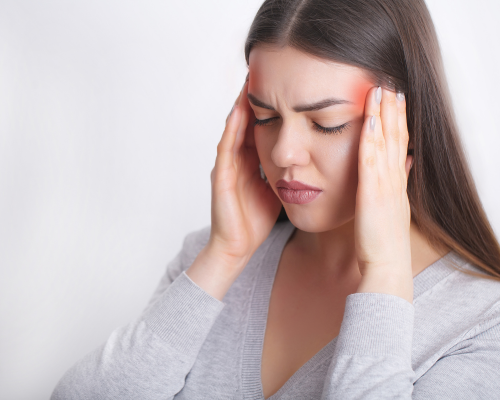Headaches and Migraines

Understanding Headaches and Migraines
At Manoshanti Neuropsychiatry Clinic, we know how challenging it is to manage headaches and migraines. These conditions can disrupt your daily life and well-being, making even simple tasks difficult. Let’s explore their causes, symptoms, and how we can help you find relief.
What Are Headaches?
Headaches are one of the most common health complaints, affecting millions of people worldwide. They differ in severity, duration, and type.
Types of Headaches
- Tension Headaches:
- Characterized by a constant, dull ache or tightness around the forehead or back of the head.
- Commonly caused by stress, poor posture, or eye strain.
- Cluster Headaches:
- Intense, one-sided headaches that occur in clusters over days or weeks.
- Accompanied by symptoms like watery eyes or nasal congestion.
- Sinus Headaches:
- Localized pain around the forehead, nose, or cheeks, often due to sinus infections.
- Chronic Headaches:
- Headaches occurring more than 15 days a month, often requiring medical intervention.
What Are Migraines?
Migraines are a type of recurring headache disorder that involves moderate to severe pain and additional symptoms, such as:
- Throbbing or Pulsating Pain: Often on one side of the head.
- Sensitivity to Light and Sound: Bright lights, loud noises, or strong smells can intensify the migraine.
- Nausea and Vomiting: Common during migraine attacks.
- Aura: A warning sign that may include visual disturbances (flashes of light, blind spots) or tingling sensations.
Migraines can last anywhere from a few hours to several days, significantly impacting your quality of life.
Common Triggers
Identifying and avoiding triggers is an essential part of managing headaches and migraines. Here are some of the most common triggers:
- Stress: Emotional tension or anxiety.
- Irregular Sleep: Too much or too little sleep.
- Diet: Certain foods like aged cheese, chocolate, processed foods, or caffeine.
- Dehydration: Not drinking enough water throughout the day.
- Hormonal Changes: Particularly in women during menstruation or menopause.
- Environmental Factors: Bright lights, strong smells, or loud noises.
When Should You See a Doctor?
While occasional headaches are normal, some symptoms require immediate medical attention:
- Sudden, severe headache often described as the “worst ever.”
- Persistent headaches that worsen over time.
- Headaches accompanied by confusion, weakness, blurred vision, or fever.
- Frequent migraines interfering with daily activities.
- Over-the-counter medications providing little to no relief.
Ignoring severe or recurring headaches could lead to complications, so seeking timely treatment is crucial.
How Manoshanti Neuropsychiatry Clinic Can Help
At Manoshanti Neuropsychiatry Clinic, we provide comprehensive care for headaches and migraines. Our approach is patient-focused, ensuring personalized solutions tailored to your needs.
Our Services Include:
- Detailed Diagnosis:
- We conduct a thorough evaluation to identify the type of headache or migraine you’re experiencing.
- Medication Management:
- Our team prescribes effective medications to manage pain, reduce frequency, and prevent future episodes.
- Lifestyle Modifications:
- We offer expert guidance on managing stress, improving sleep hygiene, and maintaining a healthy diet.
- Advanced Therapies:
- Innovative treatments like biofeedback, cognitive-behavioral therapy (CBT), and relaxation techniques.
- Preventive Care:
- Regular follow-ups to ensure long-term headache and migraine management.
Tips for Managing and Preventing Headaches
Simple lifestyle adjustments can make a big difference in reducing the frequency and severity of headaches and migraines:
- Stay Hydrated: Drink at least 2-3 liters of water daily.
- Practice Relaxation: Activities like yoga, meditation, or deep breathing can help alleviate stress.
- Stick to a Routine: Maintain regular sleeping and eating schedules.
- Limit Screen Time: Take breaks to reduce eye strain and tension headaches.
- Track Triggers: Keep a headache diary to identify and avoid triggers.
Why Choose Manoshanti Neuropsychiatry Clinic?
Our team of skilled neuropsychiatrists is dedicated to helping you regain control over your health. With a combination of advanced medical expertise and compassionate care, we are here to guide you every step of the way.
Get in Touch
Don’t let headaches and migraines affect your quality of life. Visit Manoshanti Neuropsychiatry Clinic today for expert diagnosis and treatment. Together, we can create a personalized plan to help you live pain-free.
